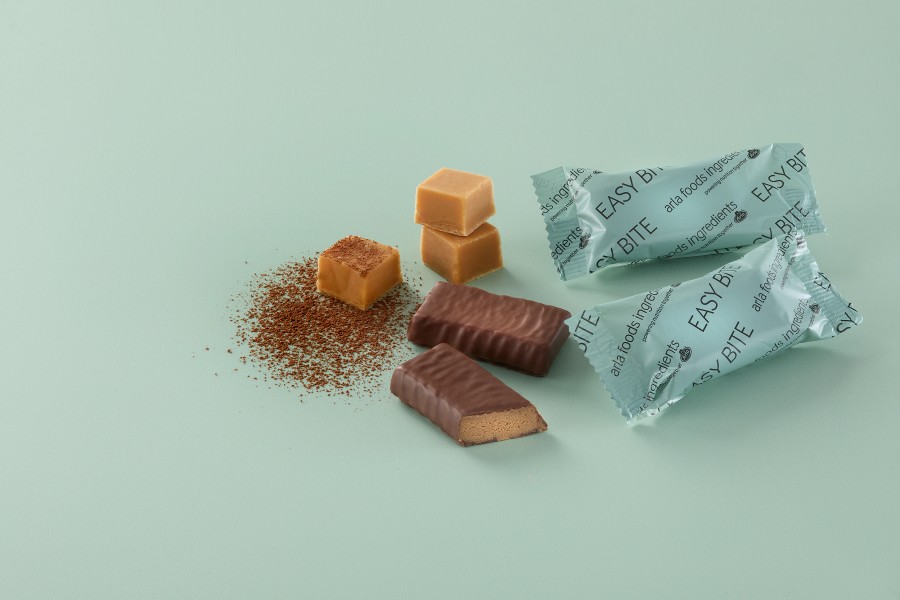
- Industry news
Industry news
- Category news
Category news
- Reports
- Key trends
- Multimedia
- Journal
- Events
- Suppliers
- Home
- Industry news
Industry news
- Category news
Category news
- Reports
- Key trends
- Multimedia
- Events
- Suppliers
SupplySide Global 2025: Inside Arla Foods Ingredients’ new high-protein bar
Key takeaways
- Arla Foods Ingredients unveiled Easy Bite, a high-protein, bite-sized snack concept featuring 40% high-quality whey protein and a clean label formulation.
- The concept tackles texture and shelf life challenges, maintaining softness and freshness for up to two years.
- Rising consumer demand for protein, influenced by health trends and GLP-1 medication use, continues to drive innovation in better-for-you snacks.
Targeting the rising consumer demand for protein, Arla Foods Ingredients debuted a high-protein snack concept during SupplySide Global 2025, developed using the company’s customized whey protein solution, Lacprodan.
Marketed as a bite-sized protein snack, Easy Bite offers up to 40% high-quality protein in a convenient 18 g serving. It contains eight ingredients, is high in fiber, and has no added sugar or fat. Crucially, it contains no maltitol, an artificial sweetener derived from natural sugars such as corn or wheat, which can often be associated with gut issues for some consumers.
In terms of shelf life, protein bars are often associated with a rapid loss of freshness due to textural deterioration. Therefore, Arla Foods Ingredients targeted a bite-sized option that remains fresh for up to two years, without the need for additional fat- or water-binding ingredients, such as collagen.
We caught up with Peter Andersen, senior director for Performance Nutrition at Arla Foods Ingredients, on the trade show floor in Las Vegas, US. He explains how the bite-sized concept originated and delves into the high-protein nutrition trends currently dominant in the F&B space.
Rise in GLP-1 medications impacts protein trends
“One of the reasons why protein receives such high interest globally is that it’s one of the macronutrients that has not been ‘hit’ by anything. Protein has a positive buzz surrounding it, and we see how people are much more interested in how to get more protein into products, whether it’s powders, cookies, bars, or beverages,” he tells us.
The rise of GLP-1 medications contributes to the high protein intake trend, but it’s just one factor, according to Andersen, who notes that people using this type of weight-loss medication are seeking ways to optimize their diets with protein.
“This trend means increasing the levels of proteins because consumers are eating less. They want to make sure they get the protein they need so they don’t lose muscle.”
Premium nutrition
Balancing taste and texture with a high nutritional content was a key part of the development process for the Easy Bite bar concept.
“Taste and texture are still king, but health considerations are increasingly important — for younger consumers in particular,” Andersen continues.
“Easy Bite is a small version of a protein bar — a little piece of chocolate that contains 7 g of protein, which is quite amazing. It’s soft and overcomes the freshness challenges that you can sometimes see in a protein bar. It tastes very good with 40% protein in a small bar, which is quite unique. There are limited ingredients in it, which makes it ideal because you do not need to add lots of artificial ingredients into the bar.”
“It doesn’t contain maltitol, which is key because this can give people challenges with their gut. Having stomach problems is different from person to person, but we are trying to get as much of it out of the protein bars as we can.”
 Easy Bite, high-protein snacking bar concept, developed by Arla Foods Ingredients.
Easy Bite, high-protein snacking bar concept, developed by Arla Foods Ingredients.
Retaining softness without a long ingredients list
Maintaining protein bar quality over an extended shelf life was another major consideration for Arla Foods Ingredients.
To achieve a consistent texture throughout the life of the product, the company used a range of the “right kinds of proteins” to maintain the same texture over a prolonged shelf life.
“A lot of protein bars have one to two years of shelf life, and it’s important for the manufacturers to keep the same texture throughout the process. By using the right combination, the protein bar continues to be soft and delicious over time,” says Andersen.
Snacking space
Alongside the rise in protein consumption, the snacking category is also growing. The majority of global consumers consider snacking an essential part of their daily routine, with health increasingly influencing their choices.
Innova Market Insights reports that the global snacks market is shaped by a shift toward “better-for-you” options, with consumers seeking healthier alternatives while still prioritizing taste and indulgence.
“We see a lot of demand in the snacking segment with a lot of people looking to get their daily protein in a snacking format, and that is why we have shots, ready-to-drink (RTD) solutions, brownies, cookies, and now a protein bar, which fulfil this need,” Andersen explains.
“The clear space, whether it’s an RTD or a powder, is just exploding. The interest is so massive right now that it’s quite difficult to keep up with the market. It appeals to a wide range of individuals.”
“When protein comes in a small format and offers a lot of protein and different kinds of tastes and flavors, more women become interested. This could be part of why the whole space is exploding.”
Protein trends do not show any signs of slowing down. The macronutrient continues to stand out as a wellness powerhouse, according to Innova, which highlighted “Powerhouse Protein” as its #2 trend for 2026.
With additional reporting by Elizabeth Green at SupplySide Global 2025 in Las Vegas, US











